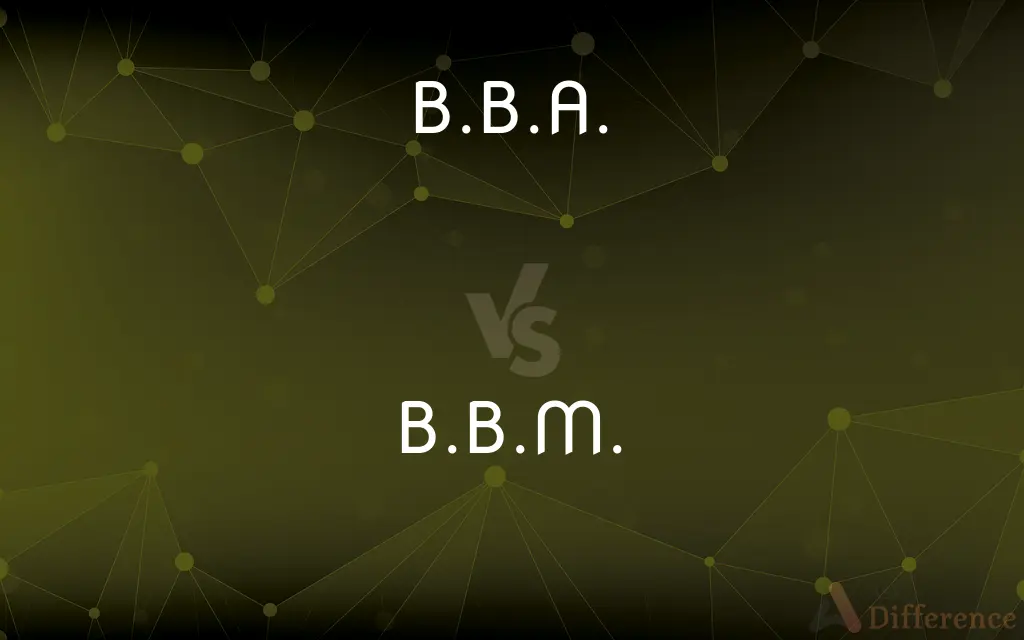B.B.A. vs. B.B.M. — What's the Difference?
By Tayyaba Rehman & Urooj Arif — Published on February 6, 2024
B.B.A. (Bachelor of Business Administration) focuses on comprehensive business management education. B.B.M. (Bachelor of Business Management) emphasizes practical management skills.

Difference Between B.B.A. and B.B.M.
Table of Contents
ADVERTISEMENT
Key Differences
The Bachelor of Business Administration (B.B.A.) is a degree that offers a broad knowledge base in various aspects of business, including finance, marketing, and human resources. In contrast, the Bachelor of Business Management (B.B.M.) is more focused on the practical aspects of managing a business, emphasizing leadership and decision-making skills.
B.B.A. programs typically include a wider range of subjects, providing students with a comprehensive understanding of the business world. B.B.M. programs, on the other hand, often concentrate on specific management topics and practical applications, preparing students for managerial roles.
In terms of curriculum, a B.B.A. often covers general business principles and entrepreneurship, while a B.B.M. may delve deeper into team management, organizational behavior, and strategic planning. The B.B.A. is often theoretical, whereas the B.B.M. is more application-oriented.
Career prospects for B.B.A. graduates are diverse, ranging from finance to marketing roles. B.B.M. graduates, however, may find themselves more suited for leadership and management positions due to their specialized training in managing people and resources.
B.B.A. programs are ideal for students seeking a broad understanding of the business world, preparing them for various entry-level positions. B.B.M. programs cater to those looking to develop specific managerial skills, aiming at supervisory and mid-management roles.
ADVERTISEMENT
Comparison Chart
Focus
Broad business education
Practical management skills
Curriculum
Wide-ranging business subjects
Concentrated on management topics
Approach
Theoretical and comprehensive
Application and practice-oriented
Career Prospects
Diverse business roles
Leadership and management positions
Target Students
Those seeking overall business knowledge
Those aiming for specific managerial skills
Compare with Definitions
B.B.A.
An undergraduate degree focusing on business administration.
She pursued a B.B.A. to gain a broad understanding of business operations.
B.B.M.
A program aimed at developing managerial and leadership skills.
Her B.B.M. helped her secure a management position.
B.B.A.
An educational pathway for understanding global business dynamics.
The international module in his B.B.A. program was eye-opening.
B.B.M.
A degree for those aiming to master business strategy and operations.
Through her B.B.M., she learned valuable strategic planning techniques.
B.B.A.
A program offering knowledge in areas like marketing, finance, and management.
His B.B.A. provided essential skills for his marketing career.
B.B.M.
An educational course tailored for future business leaders.
The B.B.M. curriculum prepared him for the challenges of a team leader.
B.B.A.
A degree preparing students for various commercial and business roles.
After completing her B.B.A., she started working in a multinational corporation.
B.B.M.
A specialized degree focusing on business management.
He excelled in organizational leadership during his B.B.M. studies.
B.B.A.
A foundation for those aspiring to enter the business world.
Her B.B.A. was the first step towards her entrepreneurial journey.
B.B.M.
A pathway focusing on the practical aspects of managing a business.
His B.B.M. project on organizational behavior was highly commended.
Common Curiosities
Is B.B.M. suitable for entrepreneurship?
Yes, B.B.M. equips students with managerial skills beneficial for entrepreneurship.
What is the main focus of a B.B.M. course?
Emphasis on leadership, decision-making, and practical management skills.
Can a B.B.A. lead to an MBA?
Yes, a B.B.A. provides a solid foundation for pursuing an MBA.
Can B.B.M. graduates work in finance?
While possible, B.B.M. is more aligned with management roles.
How long does a B.B.M. program typically last?
Usually 3 to 4 years, similar to most undergraduate degrees.
Is math important for a B.B.A.?
Basic math skills are important, especially for finance-related subjects.
What is a B.B.A.?
It's an undergraduate degree covering broad business administration topics.
What does B.B.M. stand for?
Bachelor of Business Management, focused on practical management skills.
What subjects are covered in a B.B.A. program?
Subjects like finance, marketing, human resources, and operations.
Are internships part of B.B.A. programs?
Many B.B.A. programs include internships for practical experience.
Can B.B.M. lead to high managerial positions?
Yes, it's designed to prepare students for leadership roles.
What are career options after B.B.A.?
Roles in marketing, finance, HR, and general management.
Are B.B.A. and B.B.M. degrees recognized globally?
Yes, both are widely recognized and valued in the business world.
Do B.B.M. courses include international business?
Some do, focusing on global management practices.
Is work experience required for B.B.A. admissions?
Generally not, as it's an entry-level undergraduate program.
Share Your Discovery

Previous Comparison
Single Phase Motor vs. Three Phase Motor
Next Comparison
Akita Inu vs. American AkitaAuthor Spotlight
Written by
Tayyaba RehmanTayyaba Rehman is a distinguished writer, currently serving as a primary contributor to askdifference.com. As a researcher in semantics and etymology, Tayyaba's passion for the complexity of languages and their distinctions has found a perfect home on the platform. Tayyaba delves into the intricacies of language, distinguishing between commonly confused words and phrases, thereby providing clarity for readers worldwide.
Co-written by
Urooj ArifUrooj is a skilled content writer at Ask Difference, known for her exceptional ability to simplify complex topics into engaging and informative content. With a passion for research and a flair for clear, concise writing, she consistently delivers articles that resonate with our diverse audience.
















































